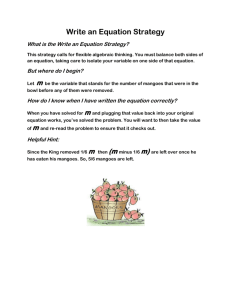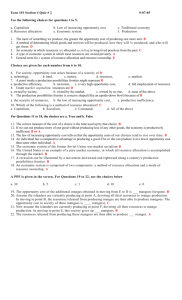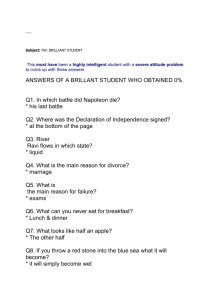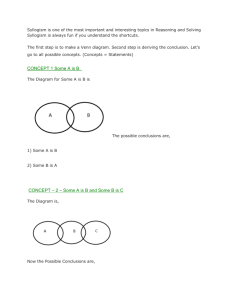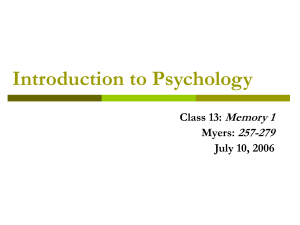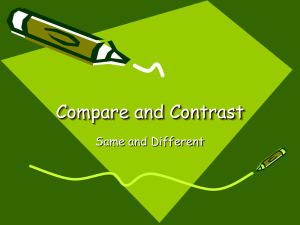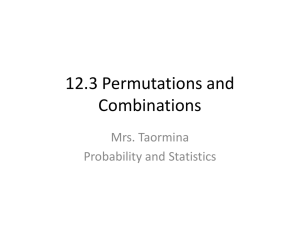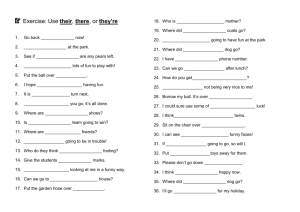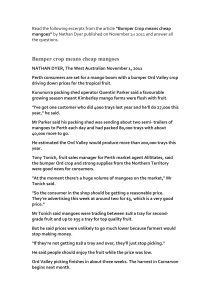32 Do you like oranges?
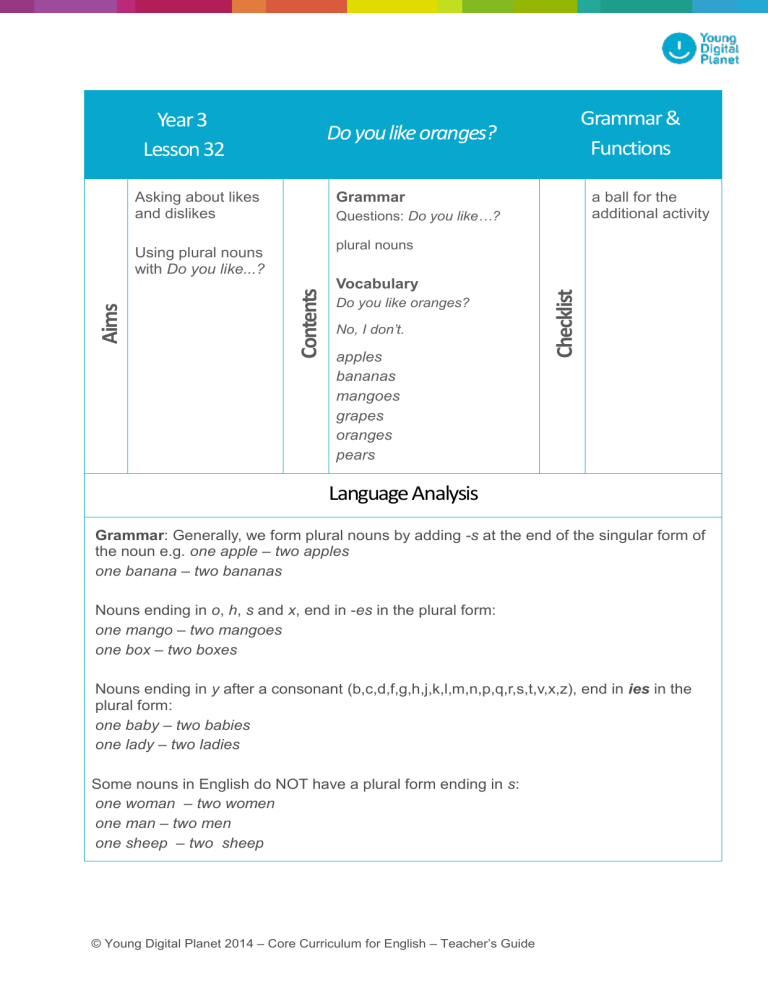
Year 3
Lesson 32
Do you like oranges?
Grammar &
Functions
Asking about likes and dislikes
Using plural nouns with Do you like...?
Grammar
Questions: Do you like…?
plural nouns
Vocabulary
Do you like oranges?
No, I don’t. apples bananas mangoes grapes oranges pears
Language Analysis
a ball for the additional activity
Grammar : Generally, we form plural nouns by adding -s at the end of the singular form of the noun e.g. one apple – two apples one banana – two bananas
Nouns ending in o , h , s and x , end in es in the plural form: one mango – two mangoes one box – two boxes
Nouns ending in y after a consonant (b,c,d,f,g,h,j,k,l,m,n,p,q,r,s,t,v,x,z), end in ies in the plural form: one baby
– two babies one lady
– two ladies
Some nouns in English do NOT have a plural form ending in s : one woman – two women one man
– two men one sheep – two sheep
© Young Digital Planet 2014 – Core Curriculum for English – Teacher’s Guide
Procedure
Warm-up
Off the screens
1. Dictate sentences containing ‘blanks’ a. I eat bananas ______. b. Grapes are ______ . c. My favourite fruit is ________ . d. Apples and pears grow on _______ .
2. When the Ss have written the sentences, ask them to finish them so they are true for them.
3. Once Ss have finished all the sentences, ask them to compare their answers with the student next to themselves.
4. Nominate 4 Ss to read out their sentences.
Screen 2
Sam: I like oranges!
Alex: Do you like bananas?
Sam: Yes, I do.
Alex: Do you like mangoes?
Sam: Yes, I do.
Alex: Do you like apples?
Sam: Yes, I do.
Alex: Do you like pears?
Sam: No, I don't.
Alex: Do you like grapes?
Sam: Yes, I do.
Exploit the scene by asking the Ss to describe what they can see. Then listen and watch the animation. Ask some questions to check understanding.
© Young Digital Planet 2014 – Core Curriculum for English – Teacher’s Guide
Screen 3
Key :
1 apples
2 bananas
3 oranges
4 grapes
5 pears
6 mangoes
Audio 1:
Do you like apples?
Yes, I do.
Audio 2:
Do you like pears?
Yes, I do.
Audio 3:
Do you like mangoes?
No, I don't.
Audio 4:
Do you like grapes?
Yes, I do.
Audio 5:
Do you like oranges?
No, I don't.
Audio 6:
Do you like bananas?
Yes, I do.
Key : 1 Yes, I do. 2 Yes, I do.
3 No, I don’t. 4 Yes, I do. 5 Yes, I do.
Screen 4
© Young Digital Planet 2014 – Core Curriculum for English – Teacher’s Guide
Screen 5
Key :
1 No, I don't.
2 Yes, I do.
3 No, I don't.
4 Yes, I do.
5 Yes, I do.
6 No, I don't.
Note: Ask Ss to work in pairs and ask and answer the questions with their own answers.
Screen 6
Key:
1 mangoes
2 pears
3 apples
4 bananas
5 oranges
6 grapes
Give the Ss these instructions for the Memory game. The aim of the game is to make pairs.
1. On the screen you will see two sets of cards ‘face down’.
2. Click on one card from each set to make a pair.
3. If it is a pair, the cards will fly off the screen. If it is not a pair, the cards will
© Young Digital Planet 2014 – Core Curriculum for English – Teacher’s Guide
turn over again.
4. Try and remember where the pictures and words are.
5. Choose two more cards to make a pair.
6. Continue until you have matched all the pairs.
7. When the Ss have finished tell them to work in pairs and in turn ask each other
Do you like …? question about all fruit in the screen.
Now it’s your turn. This is a ‘free practice’ stage.
The aim is personalisation.
Tell students to work in pairs and make a new
Memory game with more words they know.
Use the additional activity at the end of Screen
6.
Additional activity
Memory chain
– vocabulary revision.
1. Ask Ss to stand in a circle.
2. Explain that the student with a ball has to: a. report what all the others have said b. add his or her own sentence, c. ask a question d. throw the ball.
3. Start the game holding a ball and say I like mangoes. Do you like mangoes? and throw the ball to any student.
4. The student should say Mrs Green like mangoes. I like oranges. Do you like oranges? and throw the ball to another student .
5. The next student reports the two previous statements: Mrs Green likes mangoes. Tom likes oranges. I like pears. Do you like pears?
then adds his or her own sentence, asks the question and tosses the ball.
6. If a student cannot remember or makes an incorrect sentence, they are
"out".
7. The last remaining student is the winner.
© Young Digital Planet 2014 – Core Curriculum for English – Teacher’s Guide
